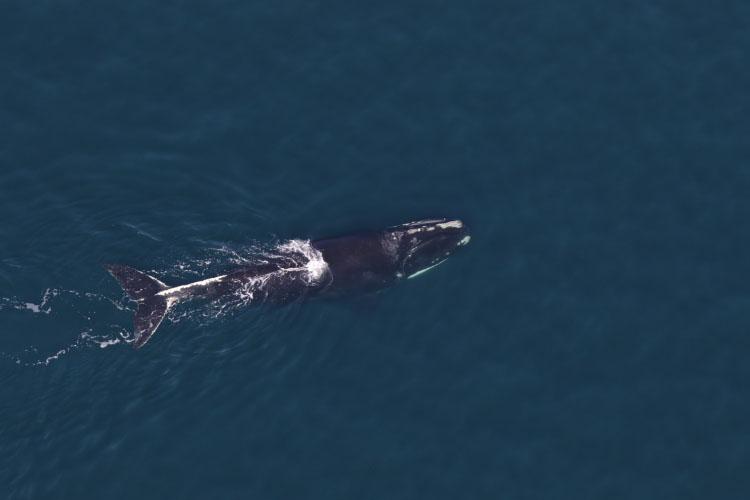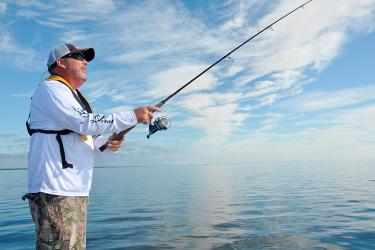NOAA Fisheries is committed to working with our partners to address the North Atlantic right whale crisis. We are investing in high-tech solutions that address the primary threats to their survival: entanglements and vessel strikes.
Endangered North Atlantic right whales are approaching extinction and experiencing an Unusual Mortality Event. There are approximately 370 individuals remaining, including about 70 reproductively active females. Human impacts continue to threaten the survival of this species. During the past decade, right whales have changed their distribution patterns, likely in response to changes in prey location and availability due to warming oceans. As their prey moved, the whales began spending more time in areas with fewer protections from vessel strikes and entanglements.
Investing in Technology to Support North Atlantic Right Whales
Technology has the potential to provide transformational solutions to prevent extinction. It could help marine industries (such as fisheries, boating, and shipping) continue to thrive.
We are directly supporting new and existing technology and investing in their development and implementation. New technology such as satellite observations will help transform North Atlantic right whale monitoring. They will improve our understanding of the whales’ distribution and habitat use to support regulatory measures.
We will also increase the use of on-demand fishing gear, and improve the enforcement of existing federal regulations.
These efforts support our overarching North Atlantic Right Whale Road to Recovery strategy. The strategy addresses threats to North Atlantic right whales and monitors our progress.
Partnership Areas
Partnering with our federal, state, industry, and other organizations is key to our progress for right whale recovery. We are working in four major areas on this crucial work to develop and deploy technologies that help protect North Atlantic right whales.
Monitoring and Modeling
- Passive acoustic monitoring
- Satellite tagging
- Uncrewed systems development
- Modeling advancements
- Very high resolution satellite artificial intelligence
Learn more about our partnerships:
Vessel Strike Reduction
- Vessel strike risk reduction technology and development
- Technology implementation
- Additional support
Learn more about our partnerships:
Partnership with MITRE to develop technologies in whale detection, vessel strike avoidance and “ropeless” fishing gear
Partnership with the National Fish and Wildlife Foundation to develop innovative technologies that reduce vessel strikes
Partnership with NASA for satellite technology to improve whale detection
On-Demand Fishing
- Developing interoperability standards
- Training for use of systems
- Additional support
Learn more about our partnerships:
Partnership with Atlantic States Marine Fisheries Commission to test fishing gear
Enforcement
- Equipment
- Operations
Technology Workshops
We host technology workshops with key partners to find new solutions to support North Atlantic right whale recovery efforts.
We hosted a virtual public right whale vessel strike risk reduction technology workshop in March 2024. It explored and promoted new technologies that offer mariners additional options for reducing lethal collisions with right whales.
In November 2023, we convened a workshop to explore developing standards for acoustic communications and data to support on-demand fishing. Fishing gear manufacturers, acoustic communications experts, fishermen, fishery managers, and other interested parties discussed the interoperability of on-demand, or "ropeless," fishing systems.
In September 2023, we co-hosted a North Atlantic right whale satellite telemetry tagging workshop with the Marine Mammal Commission, the Office of Naval Research, and Fisheries and Oceans Canada. Satellite telemetry can help determine migratory routes and habitat use in response to changing ocean conditions. Participants reviewed the best available science to inform future planning and permitting decisions regarding the use of satellite telemetry tagging for right whales and other endangered baleen whales.




